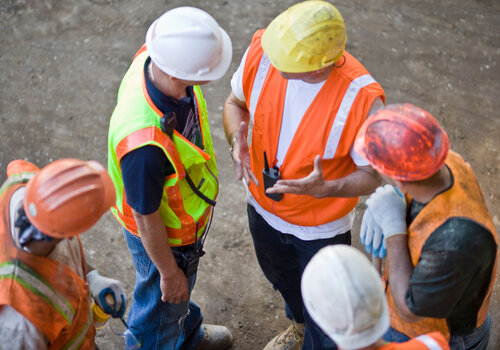The military’s encouragement of veterans pursuing construction careers is part of a broader effort to provide meaningful, stable employment that leverages veterans’ skills while meeting a critical labor need in the U.S. economy.
Military of NATE is a committee that works to support veterans’ transition back into civilian life. The committee also provides education to member companies about how veterans are a huge asset to the construction workforce. It’s really a win-win: veterans get help with this transition and the construction industry gets access to a portion of the workforce that is rich with soft skills that can translate into any trade.
“Veterans excel at thinking outside of the box and rapidly developing solutions to issues. We then work to implement the plan and attack the task, embrace this drive and allow them the space to drive a task forward,” says Mike Workman, vice president of safety and training at InfraServices and Military of NATE committee member. “Sometimes this can be off putting, especially if the veteran is new to the team. It can be seen as a ‘bull in a china shop,’ but I can assure you it is not an attempt to undermine or show up anyone. It is simply how veterans operate. We were always trained to make a decision and execute, that the worst thing you could do is not make a decision.”
I have never forgotten that I am very lucky to be in the position I am today. I am hopeful I have been able to contribute to another's growth.
Mike Workman
Military of NATE, and Vice President Safety & Training, InfraServices
Here are several reasons why construction has become an ideal pathway for veterans and why military programs are actively fostering these career transitions.
- Alignment with Military Skill Sets
Many of the skills veterans gain during military service align closely with the requirements of the construction industry. For example, logistical skills, machinery operation, attention to detail and strict adherence to safety protocols are critical in both fields. Veterans also often have experience with project management, team coordination and adapting to challenging environments—skills that are invaluable on a construction site. Military programs emphasize construction careers because they capitalize on the skills veterans already possess, minimizing the learning curve and making the transition to civilian work smoother. Veterans can also be a huge resource to DEI initiatives as being in the military exposes servicemembers to people from various backgrounds.
“The military is a true cross section of our nation that expects each member to work with a very diverse team,” says Mike. “Veterans are used to working in this environment and have generally been exposed to a wide range of backgrounds and know the strengths this brings to a team. Further, many veterans have worked closely with other nations and understand the dynamic that brings to an operation.” - High Demand for Skilled Labor in Construction
The construction industry faces a significant labor shortage, with increased demand for skilled workers driven by infrastructure upgrades, housing shortages and commercial development. The military recognizes that veterans can help address this gap while securing good-paying jobs with room for advancement. Encouraging veterans to enter construction fills critical positions across trades, such as electrical, plumbing, carpentry and equipment operation, providing both economic stability for veterans and support for an industry in need of reliable workers. - Stable and Well-Paying Career Opportunities
Transitioning to a civilian role that provides financial security and stability is essential for many veterans and construction offers one of the most promising sectors in terms of job growth and earning potential. Military programs support veterans’ entrance into construction because it’s an industry with steady demand, union protections and opportunities for career progression. With structured apprenticeship programs, veterans can quickly learn new skills and advance, providing a solid foundation for long-term success.
For long-term success, Mike suggests veterans commit to continuous learning. Education, not just in the traditional sense of going to school but learning everything you can about a trade, will help veterans immensely as careers progress.
“Do not be afraid to learn across multiple departments to learn what they do. It is difficult to determine what your career path will be when you first start out; I certainly did not envision being where I am today,” Mike says. “Put in the work required to become a subject matter expert in all aspects of your chosen vocation." - Sense of Teamwork and Mission
Veterans often thrive in environments where teamwork and mission-driven work are emphasized, which closely mirrors the culture of many construction projects. The military encourages veterans to pursue construction because the industry offers a sense of purpose and camaraderie. Construction jobs require the same level of commitment, collaboration and resilience that veterans developed during their service, helping them feel a sense of purpose and accomplishment in their civilian roles.
“When I left the military, I found the telecom construction industry to fit nicely into my strengths,” Mike says. “We generally work in small teams remotely detached from a central command structure. We are given tasks (missions) to complete using our own hard work, initiative and intelligence. There is not someone constantly looking over your shoulder like you might see in a factory.” - Connection to Community Building and Infrastructure
Construction projects, from residential developments to public infrastructure, have a lasting impact on local communities. Many veterans find fulfillment in contributing to projects that directly benefit the public, echoing their military commitment to service. The military supports this transition as it allows veterans to engage in work that is both productive and socially meaningful, providing a continuation of the community-focused mission many veterans valued in the service. - Pathways to Ownership and Leadership
The construction industry offers veterans opportunities for growth, including paths to management and even business ownership. Many veterans have the leadership skills necessary to lead teams or manage projects and some even go on to start their own construction businesses. Military programs like Helmets to Hardhats and SkillBridge, along with other Department of Labor initiatives, help veterans gain the skills needed to advance into supervisory roles or set them up to pursue entrepreneurial endeavors within the construction sector.
Mike sees leadership and mentorship as part of his role in supporting more veterans entering the workforce.
“One of my mentors told me that I had an obligation to aid in the growth of others with the goal of them having the same opportunities I had,” he says. “This can mean being there to listen when they have an issue, working to provide the training and education needed to advance, and also to hold them accountable to their goals. I have never forgotten that I am very lucky to be in the position I am today. I am hopeful I have been able to contribute to another's growth.”
THE IMPACT ON CONSTRUCTION AND VETERAN COMMUNITIES
The focus on construction careers offers substantial benefits for both veterans and the construction industry. Construction companies benefit from the discipline, teamwork and leadership skills veterans bring to their roles. Veterans, in turn, enter a field that offers clear paths for advancement, a strong sense of camaraderie and the opportunity to work in high-demand positions.
The skillsets veterans acquire during their service—such as logistics, safety, mechanical operation and team coordination—translate directly to many construction roles. Programs like NATE also work with vets to help adapt their skills to the industry, creating a supportive network for veterans as they build their civilian careers.
The alignment of skills, the demand for labor and the availability of high-quality, stable jobs are all reasons why military programs are focused on helping veterans find success in the construction industry. As veterans enter the workforce and contribute to projects nationwide, they strengthen the industry and gain new opportunities to lead, serve and build in a civilian capacity.
“Veterans are used to and are comfortable with a clearly defined advancement structure. When given this defined path and the opportunity to reach these milestones, I think you will find Veterans will own their own progression. It is important to have the advancement path defined, to ensure that it is clearly communicated and that the opportunities exist for them to obtain it,” Mike says. “If these things are done and leaders sincerely practice servant leadership, veterans will seek the opportunity. The best thing that companies can remember is that we manage processes—we lead people.”
Photo credit: EVEREST COMUNITY/BIGSTOCK.COM












